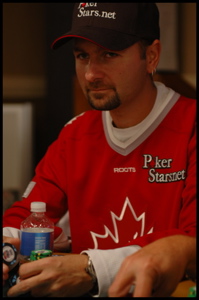 The poker world is brimming with players who are pedestalled and made part of that special elite, but when push comes to shove, these ‘stars’ are, in many ways, just the same as you and I, and come WSOP time, are just as likely to be raising our blinds as Joe Poker. However, although I’ve never been one to succumb to this fabricated level of celebrity, I must confess to have been highly excited to be picking the brain of one Daniel Negreanu. In my joyous three years in poker journalism, I’ve interviewed the likes of Greg Raymer, Barry Greenstein, Humberto Brenes and Dave Colclough, but only two players have ever left me slightly star-struck. One was, explicably, the legend that is Doyle Brunson whom I met in Vegas two years back, and the other is Kid Poker himself, Daniel Negreanu. Not even a tete-a-tete with the voluptuous Isabelle Mericer could get my blood racing like these guys!
The poker world is brimming with players who are pedestalled and made part of that special elite, but when push comes to shove, these ‘stars’ are, in many ways, just the same as you and I, and come WSOP time, are just as likely to be raising our blinds as Joe Poker. However, although I’ve never been one to succumb to this fabricated level of celebrity, I must confess to have been highly excited to be picking the brain of one Daniel Negreanu. In my joyous three years in poker journalism, I’ve interviewed the likes of Greg Raymer, Barry Greenstein, Humberto Brenes and Dave Colclough, but only two players have ever left me slightly star-struck. One was, explicably, the legend that is Doyle Brunson whom I met in Vegas two years back, and the other is Kid Poker himself, Daniel Negreanu. Not even a tete-a-tete with the voluptuous Isabelle Mericer could get my blood racing like these guys!But why Daniel? What is it that I admire so much? Daniel may have his critics, but I’ve always been a closet fan, and one whom has always respected his amicable, yet calculated approach to the game, not to mention his incredible gift of the gab – the guy could talk the most stubborn of mules into submission! Whether it be at the table, via his blog, or through the many other media outlets that he has been given access to, I genuinely respect his constant drive to speak out on anything poker related.
At the table, Daniel is, of course, one of the true greats of the game and has won numerous titles from WPTs to shiny World Series of Poker bracelets, not to mention the odd other triumph along the way. What is genuinely awe-inspiring is his ability to approach the game with the vigour and excitement of a five year old on Christmas Eve yet maintain such a firm grasp and continual awareness of what is going on at the felt. In this sense, he is incredibly skilled at making people enjoy losing their money, a weapon that so many of his peers would just love to possess.
With this in mind, it was with great excitement and anticipation, and perhaps the odd jangling nerve, that I embraced the opportunity to interview the Canadian wizard with the most outstretched of arms. As expected, his ‘I have known you for ever’ demeanour quickly settled into place and within moments of meeting we were chatting away as if we were the bestest of friends.
“Hey, buddy,” he greeted on our first ever encounter. “How’ve you been?”
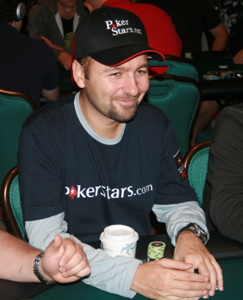 Acknowledging, yet secretly applauding those social skills that seem to come so naturally, I reshuffled my question list and asked, “You come across as an upbeat person? Have you always been like this? Do you never get depressed?”
Acknowledging, yet secretly applauding those social skills that seem to come so naturally, I reshuffled my question list and asked, “You come across as an upbeat person? Have you always been like this? Do you never get depressed?”“Yeah, I get depressed, like everyone”. I personally refused to believe the admission with the level of suspicion that I hold with most people who tend to be smiling twenty-four-seven. “There are times when I’m tired and downbeat at the table, the same as other players. I tend to be pretty positive on the whole though and just like to have fun. I’ve always been a people person and was often the prankster at school.”
“You use your personality as a way of extracting information,” I returned, hoping to dig deep into the labyrinth that is the Negreanu mind. “To what extent is this true? Do we see the real Daniel Negreanu at the table, or is it just strategy?”
“It’s Important to make people feel comfortable so they’ll come back and play,” he confessed. “If they are tight and serious, I’ll talk to them to loosen them up so they give away information and play looser. Also, we [the table] will create different games, like the seven-deuce rule you see on High Stakes Poker, so they have fun and return. When people are in a good mood, the money flows. In my view, an open, jovial approach is always the best way.”
Realising that a true pro would never unveil all of his secrets in such a sitting, I moved on to a more generic line of questioning. For as long as I can remember Daniel has been involved in the game of poker, and he still looks like a teenager. Yet for all his youthful aesthetics and energetic bounce, I can still recall his appearance on Late Night Poker all those years ago, and even then he’d already garnered a reputation as a top-notch player.
“I turned pro at nineteen, but I guess it wasn’t until I was twenty-two or twenty-three that I suddenly sat up and said, ‘Hey, you know what, I could make a lot of money doing this’. It’s then that I realised that playing poker was what I wanted to do for a career.”
“What would you be doing now if poker weren’t around?” I continued.
“Hmm, I guess I could have got into acting, maybe films,” he replied, clearly someone brimming with confidence and never in fear of setting his sights high. “Maybe I would have made a living from sports booking instead, “ he added with a slight chuckle.
Although Late Night Poker was my first sighting of him, Daniel Negreanu has become somewhat of a permanent fixture on my small screen, and can be seen on shows ranging from WPT to Poker After Dark to, most recently, the highly acclaimed High Stakes Poker. Of course, the verbal witterings of Negreanu is a sure-fire lure for any TV company, but his playing style – aggressive, plenty of pre-flop raises, etc – can result in exciting confrontations, intriguing situations and, if you bend the ear of a certain Great Dane, the odd big pot. What I wondered, however, was that after winning and losing such meaty sums, how could Daniel truly motivate himself for a tournament where the top prize is less than the figure that he sits down with at the TV cash table.
“Yes, I have to admit that I do have a problem with playing the smaller tournaments. The biggest obstacle is simply boredom, and when I am bored I get lazy and make sloppy plays. I find it really easy to lose my focus when there isn’t a huge sum of money up for grabs. I’m the sort of person who needs new challenges all of the time, and I don’t feel the smaller tournaments provide this. It’s like [Michael] Jordan playing the small league or something, it doesn’t work, the motivation just goes. I can play online because it’s such a challenge for me, but tournaments can sometimes be a struggle.”
“Do you even enjoy playing tournaments still?”
“Yeah, sure, but only the big ones. I’m planning to play most of the EPTs now, I think you can get tired of playing WPTs all of the time.”
“Do people play their normal game on High Stakes Poker,” I asked repeating a question I’d thrown at Barry Greenstein, but one that has always fascinated me.
“You get some people showing off,” he replied abruptly, obviously annoyed by those who put on a big performance at the table.
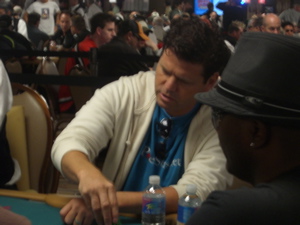 “Can you name and shame?”
“Can you name and shame?”“Well, Corey Zeidman (left) for one.” I rubbed my hands together devilishly awaiting a barrage of abuse. “Corey came on and tried to be clever, but it just didn’t work.” My shoulders dropped in disappointment. “It’s not that different really, perhaps a little livelier because of the TV cameras, but still pretty similar to a normal game. I love it myself, and I always feel very comfortable.”
One issue that has always interested me is the idea of a ‘poker celebrity’ and the experience of fame. Unfortunately, I can’t confess to possessing quite the same level of celebrity as Daniel, but it’s something that I would like to grab a taste of nonetheless, even if it was juts for one day.
“Did you set out to become a poker celebrity? Is it a part of your life that you enjoy?” I enquired.
“I find it all a bit odd really. It didn’t even exist when I started out, so I never planned to be famous. I actually don’t buy into all that poker celebrity shit, it just sort of happened. I became well known pretty quickly after coming into the game, mainly due to my win at Foxwoods.” He leaned back slightly and reminisced of a time that he clearly recalls fondly. “People just seemed to latch on. I laughed when I first saw the phrase ‘corporate sponsorship around the corner’ in a poker magazine in 1996, it just didn’t seem real.”
“Does being a poker celebrity ever get too much?”
“It can be hard times, say after a bad beat. I don’t want people to go home thinking I’m a bad person or something. The worst place is the World Series because it happens on a daily basis; it can be quite draining at times because there are just so many people. They have a private section out back with toilets and food, so that gives me a chance to breathe. Like a few of the other players, I often find myself taking back routes to try and escape the crowd.”
“You mentioned the World Series, but now that you’ve started playing the EPTs, what do you think of the European players?”
“It’s very regional here. The Brits can be easier to manipulate or exploit and their bets seem to be a lot bigger for some reason. The Scandies on the other hand involve themselves in a lot of pots, but seem to be able to play position extremely well. You just have to wait for them to hang themselves.”
“Who do you think are the good European players?”
“Roland de Wolfe and Surinder Sunar,” he replied without hesitation.
“I know you rate Joe Cassidy? Do you have any other tips for the future?”
“There are a lots of good teenagers, I don’t think I could name just one. They’re taking over the game at the moment, are they’re really good. It doesn’t worry me though, I like the challenge, and I like good players.”
“How have your protégés done? What has been the hardest part?”
“I’ve enjoyed it, and I’m going to do it again. I’ve absolutely no regrets, and one guy even won $250k. It was tough at times though as he had picked up a few bad habits that can be really hard to undo. He would often call a raise and then bet out a monster instead of considering a check-raise.”
Admittedly feigning interest in his protégé gimmick, I decided to ask one of my favourite questions that seems to inadvertently (okay, intentionally) crop up in the majority of my interviews: “If you could steal the skill of one player, what would that skill be and which player would you choose?”
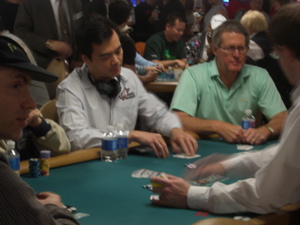 “John Juanda (right), I have a lot of respect for John. He has an incredible read on players and always seems to have a good idea of pre-flop strength or weakness. As soon as he’s got his read, he pounces.”
“John Juanda (right), I have a lot of respect for John. He has an incredible read on players and always seems to have a good idea of pre-flop strength or weakness. As soon as he’s got his read, he pounces.”Realising that Daniel is never shy of expressing his views on the poker world, I finished the interview with a couple of quick questions that I knew would get his blood circulating at a faster rate.
“What is the one thing that annoys you about opponents?”
“Man, I hate it when players take too long to fold even when they know they’re going to fold,” he replied instantly. “Many players just don’t understand etiquette,” he continued in a flash. “They think it’s acceptable to always use the time bank and just slow down at the bubble. It’s not, and to me this is bad etiquette.”
“What is the one thing about poker as a whole that you’d like to change in the world of poker?”
“For starters, I can’t believe we don’t have a governing body of any kind, it’s crazy. They have the TDA who agree to twenty or thirty standard rules so everyone knows what to expect and there’s also a WSOP committee of fifteen players, but that’s about it.” Daniel refused to take a breath. “The show one show both rule also infuriates me. It’s a dumb rule and has been completely misinterpreted, it just makes no sense. Showing cards is a psychological weapon. I tell you what else…” he continued, clearly in his element. “We could really do with a championship with bigger buy-ins and smaller fields. This would make for a much better competition. A $50k buy-in elevated tour that spans across four parts of the world, that’s what I’d love to see.”
And on that perhaps optimistic, but not unachievable note, the ever-talkative Daniel Negreanu was whisked away from my grasp and into the hands of yet another thrilled interviewer, but, even in just a frustratingly brief encounter, I felt Daniel had conveyed more than the combined cluster of poker faces who had crossed my path before. I just hoped that the next Michael Parkinson would use his time wisely, as, at times, you have to cut Daniel off to squeeze in all your questions. However, akin to the likes of Greg Raymer and Bill Chen, this was a quality that I was willing to embrace as a positive.
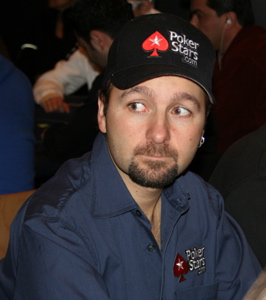 So, I may not have been given enough time to delve as deep into the Negreanu brain as I would have liked, but after scratching the surface, did my views of Kid Poker change? Is he really as amicable as I initially thought, are his views as adamant in person as they are on his blog, and does he come across as the same Daniel Negreanu that you see at the table, or is it just an act? In short, what you see is what you get with Daniel, and I firmly believe that although he is aware of how powerful a tool his likable, friendly demeanour can be, it truly is little more than an expression of his overall personality.
So, I may not have been given enough time to delve as deep into the Negreanu brain as I would have liked, but after scratching the surface, did my views of Kid Poker change? Is he really as amicable as I initially thought, are his views as adamant in person as they are on his blog, and does he come across as the same Daniel Negreanu that you see at the table, or is it just an act? In short, what you see is what you get with Daniel, and I firmly believe that although he is aware of how powerful a tool his likable, friendly demeanour can be, it truly is little more than an expression of his overall personality. With some players, you see them act all happy-go-lucky a the felt, but on the sidelines, they can be grumpy sods with no time for the people who helped raise them to the levels of fame that they are now enjoying. With Daniel, however, he is the same Daniel whether playing poker, undertaking an interview, or just chatting away with the bloggers during the break. It is this aspect of his character that I really appreciate. Although he is one of the most famous players in the game who possesses the ability to unnerve either other players with his intense social skills or the members of the public who consider him to be a film-star of the poker world, he treats you with respect and the warmth that he would show to a member of his own family. I don’t care if it’s uncool to like Daniel Negreanu, because I do, and I look forward to seeing him more frequently on the European circuit.